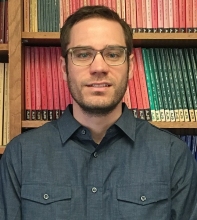Faculty members in the Department of Sociology and Criminology at the University of Iowa are demonstrating national leadership in their discipline.
Two faculty members have received funding from the National Science Foundation's RAPID program for research addressing the impact of COVID-19. The RAPID program enables the NSF to quickly process and support research that addresses an urgent need. Previous RAPID awards have helped researchers better understand and control outbreaks of diseases such as Ebola and Zika, and investigate preparedness and responses in natural and environmental disasters. Now, the program is funding research into COVID-19.
 Associate Professor Mark Berg and co-Principal Investigator Nicole Novak of the College of Public Health have received funding to understand the health and socioeconomic impacts of COVID-19 in understudied rural communities, especially in meat-packing towns. The project will, in the words of the proposal abstract, " . . . survey residents of midwestern small towns to: (1) document the health, socioeconomic, and emotional impacts of the pandemic; (2) identify local needs and effectiveness of local and state responses; and (3) understand how impacts, responses, and needs vary across diverse small towns. Findings from the project will inform governmental policies and programs at several levels, thus advancing the health and well-being of rural people and places." Berg serves as the Director of the Crime and Justice Policy Research Program at the University of Iowa Public Policy Center.
Associate Professor Mark Berg and co-Principal Investigator Nicole Novak of the College of Public Health have received funding to understand the health and socioeconomic impacts of COVID-19 in understudied rural communities, especially in meat-packing towns. The project will, in the words of the proposal abstract, " . . . survey residents of midwestern small towns to: (1) document the health, socioeconomic, and emotional impacts of the pandemic; (2) identify local needs and effectiveness of local and state responses; and (3) understand how impacts, responses, and needs vary across diverse small towns. Findings from the project will inform governmental policies and programs at several levels, thus advancing the health and well-being of rural people and places." Berg serves as the Director of the Crime and Justice Policy Research Program at the University of Iowa Public Policy Center.
 Associate Professor Mary Noonan is using RAPID funding to examine how working parents managed the care of their children in the context of day care and school closures associated with the COVID-19 pandemic in the U.S. As she states in her proposal abstract, "Findings from the project will inform policies for several levels of government and many businesses related to child-care provisions during extreme events, but also during economic recovery and beyond. As such, project findings will provide information to support economic competitiveness, health, and well-being in our society."
Associate Professor Mary Noonan is using RAPID funding to examine how working parents managed the care of their children in the context of day care and school closures associated with the COVID-19 pandemic in the U.S. As she states in her proposal abstract, "Findings from the project will inform policies for several levels of government and many businesses related to child-care provisions during extreme events, but also during economic recovery and beyond. As such, project findings will provide information to support economic competitiveness, health, and well-being in our society."
Five other University of Iowa research projects have received NSF COVID-19 RAPID funding, including one by Frederick Boehmke, professor of political science, who is studying state policy responses to the pandemic.
 Assistant Professor Victor Ray, who holds a joint appointment in the Department of African American Studies, has been named the recipient of the the 2020 Distinguished Early Career Award from the American Sociological Association (ASA) Section on Racial and Ethnic Minorities. The award recognizes exceptional achievement and scholarly contribution to research on the sociology of race and ethnicity.
Assistant Professor Victor Ray, who holds a joint appointment in the Department of African American Studies, has been named the recipient of the the 2020 Distinguished Early Career Award from the American Sociological Association (ASA) Section on Racial and Ethnic Minorities. The award recognizes exceptional achievement and scholarly contribution to research on the sociology of race and ethnicity.
In addition, Ray's article, "A Theory of Racialized Organizations," was selected by the Society for the Study of Social Problems as the winner of the 2020 Kimberlé Crenshaw Outstanding Article Award. The selection committee proclaimed the article, " . . . a tremendous contribution not just to race critical theory, but organizational theory and the field as a whole." The article, which appeared in the American Sociological Review, also received an honorable mention for the 2020 Oliver Cromwell Cox Article Award from the ASA Section on Racial and Ethnic Minorities, and an honorable mention from the ASA Theory Section in the Junior Theorist Prize competition.
 Professor Michael Sauder has received the ASA Sociology of Culture section’s Clifford Geertz Award for Best Article for his paper, “Public Ideas: Their Varieties and Careers." The paper, published in the American Sociological Review, was co-authored by Indiana University colleagues Tim Hallett and Orla Stapleton.
Professor Michael Sauder has received the ASA Sociology of Culture section’s Clifford Geertz Award for Best Article for his paper, “Public Ideas: Their Varieties and Careers." The paper, published in the American Sociological Review, was co-authored by Indiana University colleagues Tim Hallett and Orla Stapleton.